#I think it’s also worth mentioning that many autistic traits are normal human traits with a higher severity than most
Explore tagged Tumblr posts
Note
Are we sure AlCal is not autistic?
to be completely honest the thought has crossed my mind before, especially because I notice a lot of similarities and traits between myself as an autistic person and him, but that’s a deeply personal thing for a person to come to terms with and even be open about, so to freely speculate about it or decide on it for him (or for anyone, really) is incredibly violating and disrespectful, and ultimately it’s best to keep it to his character /nm
#holdthypeace.txt#alcal#spn#jack kline#I think it’s also worth mentioning that many autistic traits are normal human traits with a higher severity than most#anyone can stim and everyone needs to because it came free with having a sensory system etc#so even the similarities I think I see in him don’t mean anything#also I don’t mean to say you’re being disrespectful! wanted to clarify that :]
4 notes
·
View notes
Text
Neurodivergency, and Sephiroth
Right, I’m going to see if I can try and explain why this reading appeals to me.
For some background, I’ve watched a full silent LP of the OG, watched Advent Children, and am largely familiar with his characterisation in Crisis Core(though it gets a bit patchy in some areas). I am not familiar with his characterisation in KH, Dissida, or any other spinoff appearances.
I’m going to be looking at this with an autistic lens, as, hey, I’m autistic, however much of these patterns aren’t exclusive to autistic people by any means and thus are fairly applicable to other labels.
This is an explanaition on why I find this element worth considering, and while I hope that others can relate or take away something from this, in many ways it is highly personal and not intended to be a decleration on Sephiroth’s ‘true nature,’ as it were. I’m not claiming that this was intended by the writers-- Infact, I’d be very surprised if they considered it, at all --As many of the traits he exhibits could be brushed aside as due to his upbringing.
That being said, let’s get into it!
1. Alienation
A common thread in neurodivergency, autism in particular, is some form of alienation. This doesn’t necessarily mean being outcast-- I, for one, have been largely accepted by those around me, and yet there is still that sense of being ‘other‘ that’s always been there, long before I even had a word for it.
Now, of course, in Sephiroth this is more related to his lineage, and how it’s expressed in... well, everything. Even still, I find value in expanding that, and considering just how getting the sense you’re implicitly divided from your peers.
There is, of course, the matter of Sephiroth’s literal isolation-- However, as fun as those scenarios are to play around with, I don’t think Sephiroth was raised wholly, or even mostly in the labs. The reason being that it would be nigh impossible to have hid just what made Sephiroth different, especially knowing how observant he is. It’s clear that Sephiroth had had extensive contact with other children, as epitomised by the line:
“I knew ever since I was a child, I was not like the others. I knew mine was a special existence. But this is not what I meant!”
Sephiroth was painfully aware that he is different, even if he didn’t know exactly how. It is at once an oddly thrilling, and lonely sensation. Thrilling, because-- Hey! --You can do and see things others can’t and/or wouldn’t; and lonely, because it makes it hard to relate to others or have them relate to you.
2. Socialisation
I would like to start off by saying that, while I find it a tad more faithful and endlessly less grating than Sex God Sephiroth, Sephiroth is not a complete and utter social failure. While it’s clear he has difficulty articulating emotions and understanding others, it’s very clear even still that he knows how the game works, and knows how to play it.
This is going to dip far more into speculation territory, so buckle up.
A thing that, perhaps, I don’t see talked about often enough online when it comes to neurodivergent experiences, is that many things that are considered ‘normal‘ get experienced as systems that we need to actively learn and maneuver-- Socialisation especially!
Now, of course there is always some degree of social interaction being a give and take, a step forth and step back, regardless of neurotype, but it’s dialed up far more when you deviate from ‘the norm.‘
If I can give my own example, a thing I struggled with when I was little was humour! Not because I didn’t find things funny, or didn’t know what it was, but because I had issues grasping at the machinations of what made something funny. This lead to alot of nonsensical jokes that left my siblings confounded, until I picked up a joke-book, and started analysing from there. It was mostly alot of puns, which! Due to their simple structure, are a great way to learn the basics! I didn’t even know this was unusual, until my mother pointed it out to me years later.
And that method goes for alot of things.
Sephiroth, above all else, is observant. He makes efforts multiple times throughout the OG and Crisis Core to check up on others and ask how they’re doing. He asks Cloud how he feels returning to his hometown, and about seeing his mother, and urges Zack to check up on Aerith in Crisis Core, to name some notable examples. Even if you get the sense that his attempts are, perhaps, a little ungainly, it makes it clear more than anything that Sephiroth tries.
I think the reason that people have leaned alot more into the overly-awkward perception of Sephiroth in recent times, is because it humanises him. I feel there’s been far more of a shift within fandom to focus on the mundane, on relatability, on humanity. A veneer of endless, effortless confidence really isn’t that sexy anymore-- When sexual-appeal even comes into the matter, at all.
That being said, this section more than anything, I think, is very easy to brush aside due to his... interesting upbringing. Depending on how you construe the timeline, Sephiroth got sent to war as early as twelve, and wouldn’t have had much of an oppurtnity to develop these skills in a healthy and timely manner.
Even without that, a degree of social awkwardness is far from exclusive to any particular neurotype-- It’s the way it arises in him, though, that piques my interest.
3. Analysis and Obsession
This... I think, is the one where I’ll be grasping at straws the most.
While, yes, the obsessive research demonstrated in the OG during the Nibelheim incident and even before that to a lesser extent in Crisis Core could be some indication of a degree to absolutely immerse yourself in a subject in that Very Autistic WayTM, more than anything these are brought on by dire circumstance(the former especially by the question of his very humanity), and as we don’t see Sephiroth as a child, it’s uncertain as to whether he displayed these behaviours as such and to this degree under ‘normal‘ circumstances.
Even so, I get the feeling that Sephiroth is very analytically-minded, in a very Stranger In A Strange World sort of way(not in any way referring to the 1961 novel by a similar name, lmao). I get the feeling he’s the type of person to pick up some highly-esoteric text just for fun and come away with a menagerie of strange and unusual and obscenely specific factoids that he’ll remember for the rest of his life.
Like, someone might mention a topic offhandedly, and though he’d keep his mouth shut because He’s Like ThatTM, a slew of all the little bits and pieces he’s seen or read on the matter over the years would just jump to mind.
What I’m trying to say is, I think Sephiroth would take joy in painstakingly pouring and mulling over topics that not many people would have the consideration nor the mind to hold any long-term, inimate interest in.
If the last point was easily brushed aside, then this one you’d merely have to breathe and it’d fall apart. Nonetheless, I feel that within fandom’s current common framework with how we perceive Sephiroth, this wouldn’t be too much of a stretch.
I, however, want to make it clear that I can see the issue with labelling Sephiroth as neurodivergent. He could all too easily fall into the cliché of cold, emotionally and socially-inept, often rather callous depictions we see all too often in the heavily-neurotypical media that sees us as Missing Something; less than. Things have gotten better, but even still, there’s such a tendency to flatten us down to the things we can’t do, or lawd as us Potential Einsteins in spite of it-- Which, just, while it happens, on the whole it isn’t very helpful or realistic to expect this from us.
We are by no means a monolith, and while I take comfort in the idea of a neurodivergent Sephiroth, I understand that for some, it can feel like taking on a label to a character that vaguely fits the stereotype, and thus, perhaps, insinuating that to be autistic you have to look Like That-- And when it comes to villains in particular, it’s all too easy to dip into demonisation.
This isn’t even getting onto some of the issues that’d have this fall apart, were we to look at other symptoms. The first that comes to mind, and one that even I, as innocuous as I am, experience: sensory overload.
While it is entirely possible that Sephiroth learned to deal with it accordingly in life, or was forced to surpress it, because Shinra’s Science Department(cough cough Hojo) has been shown time and time again to force its subjects into little boxes and blame them for any failures expressed, the fact is that such a symptom could make fighting on the battlefield downright impossible.
Again, this is something that could’ve been given a ‘solution‘(as much as you can or even should think about long-term surpressing your basic thresholds), it nonetheless remains an issue.
I just hope that, on the whole, this served as some food for thought.
TL;DR: Sephiroth is autistic because I Vibe With It.
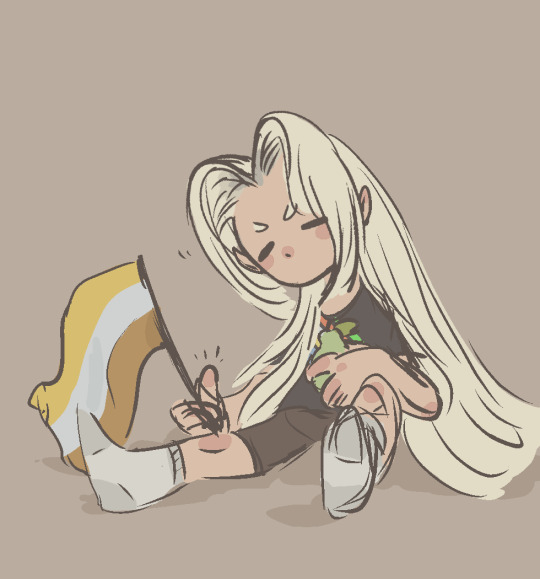
Also, happy Disability Pride!
61 notes
·
View notes
Photo
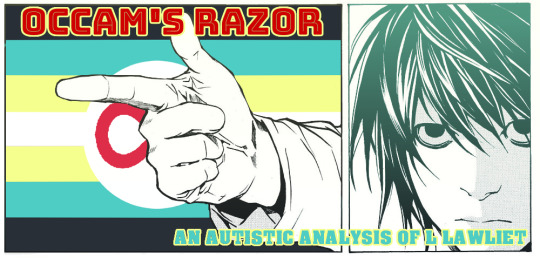
Occam's razor is the principle that, of two explanations that account for all the facts, the simpler one is more likely to be correct.
this post is going to cover traits specific to the manga and the television drama, since those are the best adaptations to showcase L’s autism. THIS POST is required reading before you read anything i’m about to type, because it explains what kind of character niche L falls into--an unintentionally autistic coded character. i’ll talk more about that at the end.
i’m going to talk about manga L first, since he’s the original version after all. i’m going to go in order of physical traits, to behavioral, to his character writing. also, tumblr eats posts that have outside links, so i’m going to have my non-tumblr sources in a separate post, here.
anyways, more under the cut!
MANGA/ANIME:
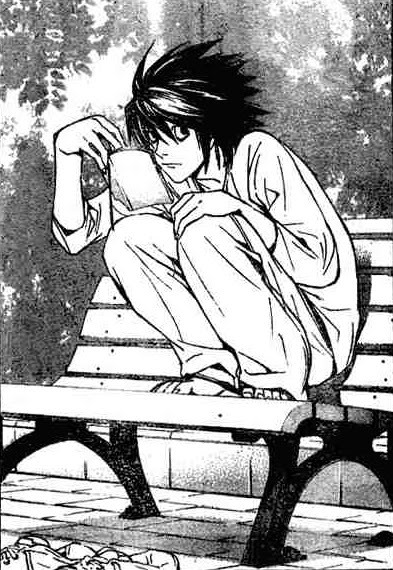
sitting with his legs up and spine bent / sitting on the floor
this is such a big one and its extremely common in ppl with autism. sitting in chairs normally is uncomfortable to outright painful w many ppl with these disorders, myself included. L sitting like that (which, to recall, is a blatant homage to sherlock holmes, another character that is so blatantly autistic coded you can find absolutely ridiculous amounts of writing on the topic) and being like "I HAVE TO SIT LIKE THIS TO THINK PROPERLY" is so autistic. like sitting in a certain way to give you specific sensory stimulus/avoid distracting discomfort and pain is a thing. i found this post (1) written by an autistic person on the topic of sitting in chairs being uncomfortable, and it says as much:
“I suspect that seating discomfort is common in autism (though by no means limited to autistic people). Many of us, particularly as children, benefit greatly from chairs designed to be non-stationary: rocking chairs, “fidget” chairs, and so forth. These can improve focus, compensate for proprioceptive hypo-sensitivity, and alleviate restlessness. In short, many “attention issues” can be fixed simply by providing a little motion for the person sitting. Small change, huge results. That's what accommodations do at their best. They make (often minor) adjustments that have profound impacts.”
so when L says that sitting the way he does, for a specific sensory experience, improves his ability to think, it’s perfectly in line with this idea. Also it’s a good pressure stim.
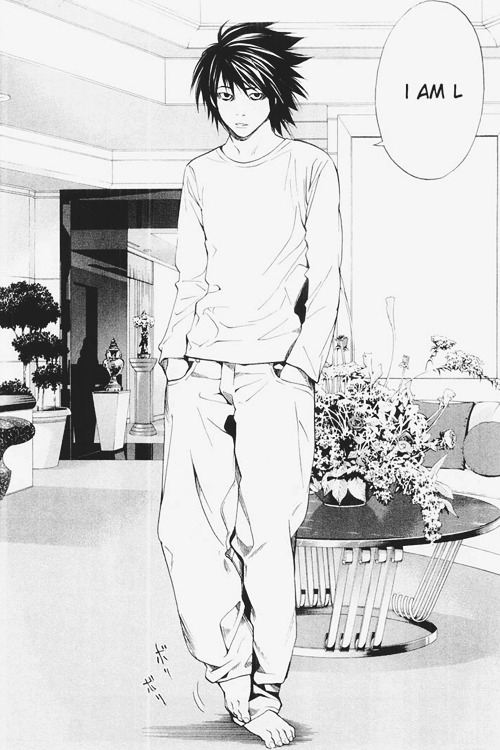
standing with a slouch / shifting his weight around
to begin: yes! it’s very common for autistic people to stand or walk oddly for a number of different reasons, from physical comorbidity to other issues such as dyspraxia (see: movie L). From an article by YAI (2), an I/DD (intellectual and/or developmental disabilities) community program:
“Kyphosis (a curved spine), collapsed chest, dropped shoulders and even scoliosis are observed in many of our patients. These myriad of postural issues may result from reduced strength, decreased biomechanical stability, or from a sensory impairment, such as apraxia.
Depending on the scene, L has mild to severe kyphosis which is very common in autistic individuals. Other things mentioned in that article if you want to click on it is instability in standing, where you sort of shift your weight around a lot between your feet or rest all of your weight on one foot, which L is literally doing the first time we see all of him.
speaking with a monotone voice.
i obviously can’t show a picture for this one and it honestly depends on the voice actor you find for L, but in the anime in particular L has a very flat tone. a lot of this is bc he has a dry sense of humor but. just know that it’s very common for autistic people to have a flat affect (or go the other way into being too loud/emotive).

his eating habits.
a lot (a LOT) of autistic ppl myself included can only eat certain kinds of food for texture and flavor reasons. HOWEVER there’s a term in the autism community called “samefoods” which is really well put by tumblr users candidlyautistic and autism-asks:
“Samefoods or samefooding is a community word to describe the autistic trait of eating the same food over, and over and over . . . It is part sensory, part routine driven in most cases. A lot of times we samefood because we need that particular mouthfeel / texture / taste, and a lot of times even after that need passes, it turns into a need for routine until you actively dislike that food again.”
“Samefooding on the other hand is closer to a special interest. When I have a samefood (chocolate ice cream, currently), I really, really want that food. I could eat that food endlessly and not get tired of it. I will get upset if I’m not able to have the food in a day. For me, it usually is kind of routine based as well. For instance, with my current samefood, I have some in the evenings and it’s become part of how I wind down from my day.”
we don’t know exactly why L specifically desires sweet food or if he considers it part of his routine, but what we do know is that he really wants to eat sweet food and avoids eating anything other than sweet food, so it could either be that he’s a picky eater and can’t handle savory or he’s samefooding on sweets!
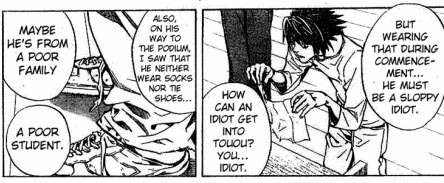
wearing the same clothes
L wears the same clothes every single day. It’s also worth noting that what he does wear is baggy, too-big clothing, the kind that wouldn’t be tight and uncomfortable. once again, sensory issues are a huge thing for autistic individuals. one of my favorite aspects is that in no adaptation does he wear socks. even L wears shoes, he wears them like slippers, not putting them on all the way. people comment that he seems like he’s poor, but we know for a fact that he’s very rich and that wearing these clothes is a personal choice he made.

not caring for himself/outsourcing his self-care
i don’t think one day is exactly canon, rather it’s an exaggeration of what might actually happen--i.e. L doesn’t have a huge closet full of the same outfit, but he does have several versions of the same outfit on rotation; L doesn’t use a human washing machine, but Watari might help him/encourage him to bathe regularly. One Day is a parody comic, but it was made by the creators for a reason and that reason is that L pretty obviously relies on a caretaker (Watari) for his personal needs. Watari, in the manga proper, cooks and cleans and does most things for L. we’ll come back to this topic when we get to the drama though.

doing stimming behaviors
if you don’t know what stimming is, it refers to self-stimulating behaviors, usually involving repetitive movements or sounds. everyone stims to some extent, but in autism it tends to be more obvious, go on for longer, and sometimes be more disruptive to others. it’s often used to help deal with sensory overload, or used to express feelings--think of an autistic person being happy and flapping their hands in the air.
there are a LOT of instances of L displaying stimming behavior, from stacking his food or things on his desk, to spinning in his chair, to biting his fingers/using them to press on his lips, to wriggling and tapping his toes. here are some specific instances:


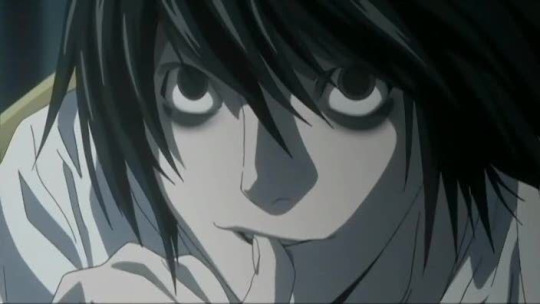
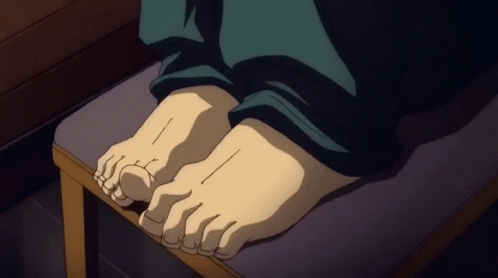
there are a lot more. i’ll talk about more when we get to dramaverse, but if you rewatch/reread death note it’s definitely worth noting whenever L does something like this!
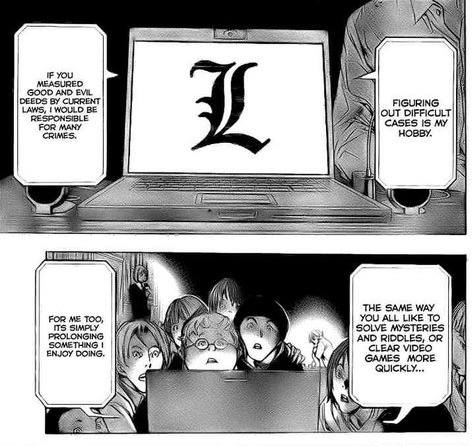
detective work as a special interest
ok, first and foremost i want to establish what a special interest is. Tumblr user cartoon has my favorite explanation of what a special interest is that i’ve seen to date:
“To have a deep, intense, passionate and incredibly focused / narrowed interest in a certain area of study, subject, topic or thing - to the exclusion of other interests. This interest is something that exists for the long-term, most often lasting for multiple months, years, or even you’re entire life “
L says that he only does detective work because it’s a hobby, and he finds it entertaining. We’ve also seen that he’s been at it for quite some time--if you take side content (the wammy’s house comic, LABB) seriously, then he’s been at it since childhood, with unwavering interest. it definitely comes across to me as L having a special interest in detective work, rather than it just being a normal hobby or a job for him, especially since he says it isn’t out of any moral obligation.


germaphobia
Germaphobia is very common for individuals with autism. a lot of the time it’s actually sensory issues associated with “dirty” things, and a lot of the time it’s because features of OCD are heavily comorbid with autism, including contamination OCD and such fears. regardless of the reason, though, L’s aversion to touching Bad Things is a very autistic behavior, and so is his resulting quirk that he tends to hold things in a very odd manner!

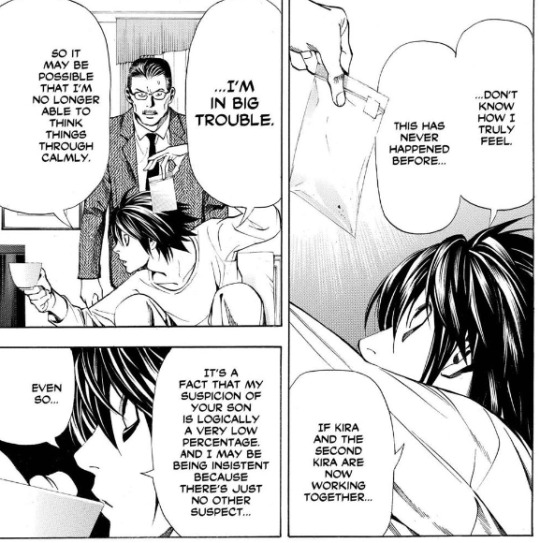
muted emotional expression
this is getting more into L’s character, but L tends to feel and express emotions in a very muted way. not to say he doesn’t have them, but for instance in the example above, L doesn’t have a solid grasp on what exactly he’s feeling. he thinks he might be acting irrationally and overemotionally because he logically should be afraid, but he isn’t sure, and none of these emotions present themselves visibly.
i’ve also seen it said that Ukita’s death is another good example of his muted response to emotion--he tells Aizawa to stay rational and his voice doesn’t waver as he tells him as much, but he holds himself tightly. for someone with poor emotional competence, these physical signs of distress can be hard to read in oneself, but Aizawa (a man who is extremely in-tune with his emotions) can tell immediately.
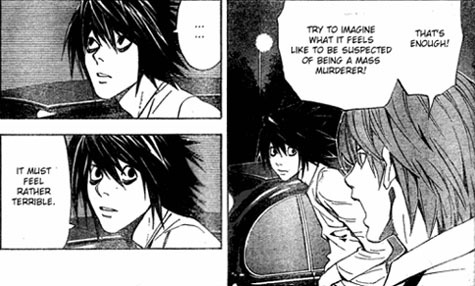
high logic, low empathy
L is also a character who, like many autistic people, lacks a certain degree of empathy. it’s not that he doesn’t have any, but it’s limited enough--and he values logic over it enough--that he’s willing to make extreme decisions and take a “ends justify the means” approach (such as using people as bait.) in the example above, L takes a moment to work through what it must actually feel like, which rings as very autistic.
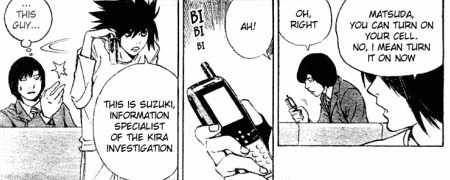
bluntness/not caring about social convention
there are so many examples of this i honestly could list them all day, but L is a character who is very to-the-point and doesn’t care about mincing his words. he can be outright rude to the people around him, especially if he considers them not worth basic courtesy. see: Matsuda.
DRAMAVERSE
if you all knew me you should have known this section is inevitable. i’m not going to talk about every single adaptation because i do not have the time and the only other adaptation that is meaningful in that regard is the movieverse (i am fairly certain that movie L is dyspraxic) but on account of the fact that i don’t care about them i won’t subject you all to them here.
anyway, drama L shows much the same traits as animanga L above (they are, after all, technically the same character) but he displays them in different ways.
he has a much more advanced degree of germaphobia, with Watari saying he’s sensitive to outside air and spraying everyone who enters his space with disinfectant, but not making them wash their hands or anything like that, so we can kind of tell that his issues are more rooted, again, in a fear of germs rather than any actual medical issue. he wants to feel as though he is clean, not necessarily actually be clean. this is very common in contamination OCD, which has a high comorbidity with autism. (my girlfriend has a very good headcanon post about drama L and OCD that isn’t so much analysis than just plain fun, but it’s worth a read!)
he stims, but he has a different array of stims than animanga L--he chews on his jelly pouch bottles,

he tosses it between his hands,

he kicks his feet,

and he bounces in his chair.

he still sits in an unconventional manner. he still samefoods, this time even more exclusively--he only eats Lucky Charge jelly pouches and nutritional bars. Watari onscreen puts his shirts on for him, as well as cooking, cleaning, and mending his clothes for him.
however, there are a few traits that are drama-exclusive that i think really add to an analysis of his autism!
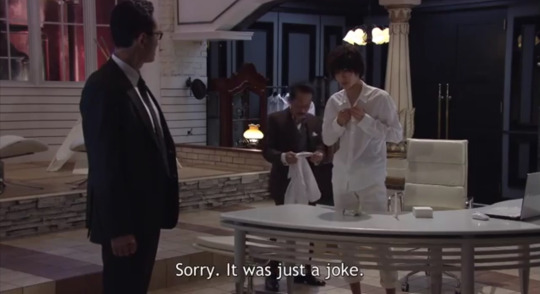
social scripting
social scripting and echolalic scripting are both commonly described as “scripting,” but are very different! echolalic scripting is like echolalia, but echolalic scripting is the recitation of longer passages of dialogue from things the individual has heard before. but social scripting is when you memorize common conversations so you can rattle it off without worrying too much! this can be very handy, such as exchanging basic pleasantries or ordering food, but it can also backfire if someone responds in a way your script’s not set up for. you can find more information on the difference in this video (3).
now, this relates to L in that there are two separate scenes where L says the same thing, rather inappropriately:
L: When I consider Kira’s personality, could it be that the strong-willed daughter is Kira? Or could that sweet-looking son of yours surprise us by proving to be him? You never know what humans are hiding beneath the surface... Soichiro: Enough. L: Sorry. It was just a joke.
-- Episode 2
L: Light-kun. Oh, I’m sorry... If I called you “Yagami-san,” it would be the same as what I call your father. Light: That’s okay. Call me whatever you want. L: Then what about Kira? (silence) L: It's a joke.
-- Episode 4
one could say that L just has a terrible sense of humor--and, of course, having a poor grasp of humor is common with autistic individuals--but the fact that he says nearly the same thing as a defense twice makes me feel as though he has it rehearsed as a defense when people react poorly to things he’s said, which happens often.

mirroring and echolalia
echolalia was briefly covered in the previous example, but for those unaware, via wikipedia (4):
Echolalia is the unsolicited repetition of vocalizations made by another person (when repeated by the same person, it is called palilalia). In its profound form it is automatic and effortless.
mirroring, on the other hand, is explained as such, also via wikipedia (5):
Mirroring is the behavior in which one person unconsciously imitates the gesture, speech pattern, or attitude of another. Mirroring often occurs in social situations, particularly in the company of close friends or family. The concept often affects other individuals' notions about the individual that is exhibiting mirroring behaviors, which can lead to the individual building rapport with others.
both of these are very common in autism, and they’re exemplified while L’s character is established watching his favorite TV show, Owarai Paradise. On one occasion, he’s watching the show and this dialogue happens:
Hiroshi: Despite never telling her how I felt, I still got dumped. I am Hiroshi. Watari: Who was this one again? L: He is Hiroshi. Hiroshi: I am Hiroshi. I am Hiroshi.
-- Episode 2
it’s important to note that in Japanese, “He is Hiroshi” and “I am Hiroshi” are said, at least in this instance, exactly the same, so L is echoing precisely what he’s heard.
On another occasion, L is again watching the show with a glass of wine (seemingly acquired simply to imitate the characters onscreen, as he never drinks it) and when the characters onscreen toast their glasses, L does the same, mirroring them.
CONCLUSION
I linked a post at the very beginning of this analysis talking about how characters are unintentionally autistic coded, and it’s important to understand how this unintentional coding is different from a headcanon--i didn’t make up these traits. they aren’t something that only exist in my head that i ascribe to L for fun.
i made this analysis both because i wanted to share L’s autistic coding in one cohesive place, because plenty of people have made lists before, but none that i could find that included so many examples with images and explanations--and i also made it because of the old ryuzaki persona “theory.”
for those unaware, the ryuzaki persona headcanon suggests that L faked all of these traits in order to make people uncomfortable, to put them off-guard and better mask his identity. i’ve seen posts about people claiming that nobody could actually behave in these ways, that L would surely be unhappy and uncomfortable sitting like that, or eating like that, or engaging in any of these behaviors. I’ve seen some people outright say that L isn’t autistic, but his persona is--that is, he’s pretending to be autistic.
i named this essay “occam’s razor” because, to me, L being autistic is the simplest answer to account for all of these traits. claiming that an autistic coded character is faking it is ableist and it just doesn’t make sense with anything else we know about his character.
but if you want to know more about that, i recommend reading eyecicles’ first!L tag. it’s debunked it in more ways than i ever could.
anyways, in conclusion
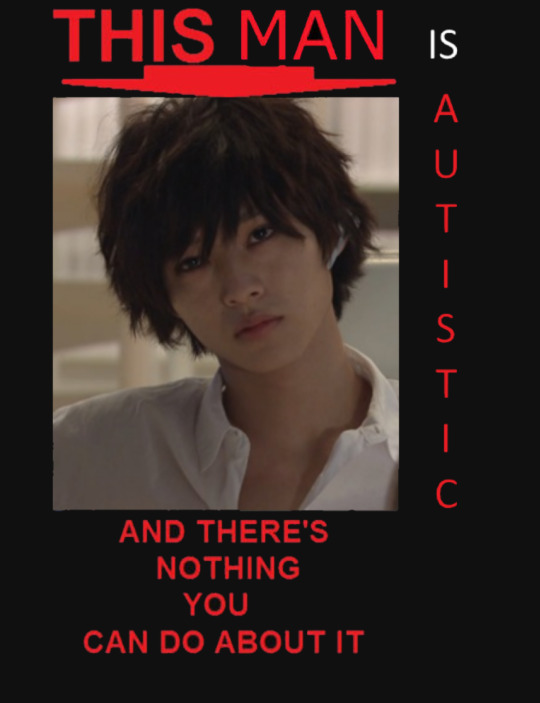
352 notes
·
View notes
Text
daniil dankovsky is autistic and here’s why:
because i’m autistic and i said so
i kid, obviously. what sort of autistic person would i be if i wasn’t read to back up my silly little claim with an overly long post of evidence a total of three people will read? (hi ned hi jordan hi raven :))
i’m aware that this is cringey because adults aren’t supposed to have autism or interests or talk about either of those things, but this is my blog and you are free to block me if the cringe is too much for you.
these are some things i picked out from the DSMV’s diagnostic criteria, found on the CDC website:
deficits in social-emotional reciprocity
reduced sharing of interests, emotions, or affect
abnormal social approach
abnormalities in eye contact and body language
defecits in […] understand[ing] relationships
difficults adjusting behavior to suit various social contexts
repetitive motor movements or speech
rigid thinking patterns
highly restricted, fixated interests that are abnormal in intensity or focus
hyper- or hyporeactivity to sensory input
there’s also some misc. stuff not in the diagnostic criteria (though it may be in the adir or gars-3) i thought was worth noting.
important note from the diagnostic criteria: “symptoms cause clinically significant impairment in social, occupational, or other important areas of current functioning”. i’d say that in his case, they do.
spoilers for pathologic classic, pathologic 2, and the marble nest
deficits in social-emotional reciprocity
in bachelor route of classic, daniil
seems completely oblivious to eva making advances toward him, to the point where she complains to him that he’s ignoring her in favor of asking questions about simon.
seems surprised when people mention maria being in love with him, despite outright asking her a couple of times if she’s flirting with him.
not to mention the fact that he asks her that at all.
his inability or resistence to making connections with others is typically considered one of his character flaws. although it is not outright stated in the dsmv criteria, one trait of autism and other neurodivergencies is “having extremely high or extremely low empathy” - and daniil, despite being a doctor, lacks empathy. which is not to say he doesn’t care at all. i think that he does, but is terrible at showing it.
for example, this scene from marble nest:
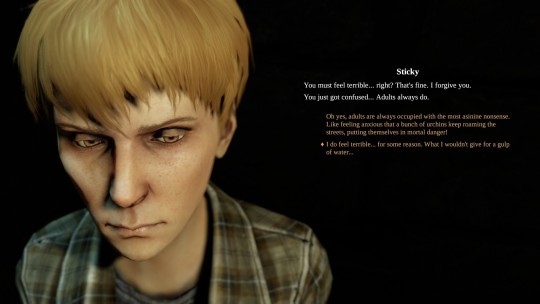
Sticky: You must feel terrible… right? That’s fine. I forgive you. You just got confused… Adults always do. Daniil: Oh yes, adults are always occupied with the most asinine nonsense. Like feeling anxious that a bunch of urchins keep roaming the streets, putting themselves in mortal danger!
daniil clearly cares about sticky’s wellbeing (and the wellbeing of the kids looking after him, though he’s not cognizant that he’s in a coma), but his way of showing it is… kind of by being a jerk. all of which bleeds into the next item on the list
reduced sharing of interests, emotions, or affect
he has no problem sharing his interests, but in both pathologic classic & pathologic 2, daniil speaks with a flat affect - which is to say that he lacks intonation. the words we read him saying may be dramatic or come across as passionate, but the actual voice reading his lines is very monotone, which may contribute to being read as lacking emotion.
and in pathologic 2, he has a voiceline lamenting not telling “her” (eva?) how he felt
in marble nest, he’s teased by the tragedians for being “heartless”:
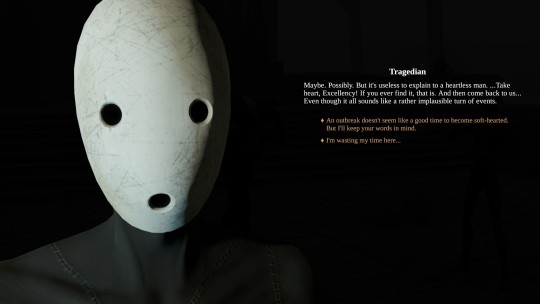
Tragedian: Maybe. Possibly. But it’s useless to explain to a heartless man. …Take heart, Excellency! If you ever find it, that is. And then come back to us… Even though it all sounds like a rather implausible turn of events.
abnormal social approach
daniil has a tendency to say things that are tactless, odd, or just socially inappropriate. i probably don’t need to point out too many examples, as i think it’s fairly obvious - these are the things people love to pick at when it comes to him, but i do have a few in mind. like, for example, from haruspex route in classic:
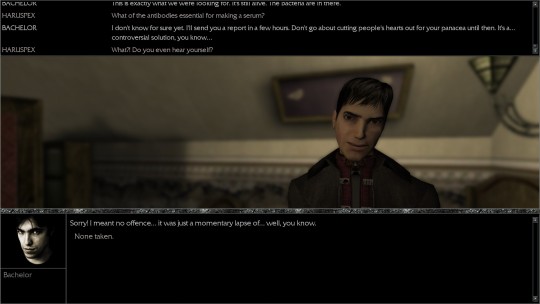
Haruspex: What of the antibodies essential for making a serum? Bachelor: I don’t know for sure yet, I’ll send you a report in a few hours. Don’t go about cutting people’s hearts out for your panacea until then. It’s a… controversial solution, you know… Haruspex: What?! Do you even hear yourself? Bachelor: Sorry! I meant no offence… it was just a momentary lapse of… well, you know. Haruspex: None taken.
until artemy points out, daniil doesn’t seem to be aware he just said something rude. even with therapy, picking up on social cues doesn’t come naturally to people with autism, so we tend to say things that come across as rude or strange to others without realizing we’ve put them off. we tend to lack a “filter” that tells us when things are or are not appropriate to say. even when we may recognize it, the rules may not make any sense to us. for example, it makes very little sense that allistics favor politeness over honesty.
i think the glaringly obvious abnormal social approach in pathologic 2 is him threatening to hold artemy at gunpoint to get in the house, which is just overkill, but my personal favorite comes on day 7, when he’s complaining about the orders aglaya has given him. artemy stops him to say he doesn’t understand what daniil wants from him, to which daniil replies:
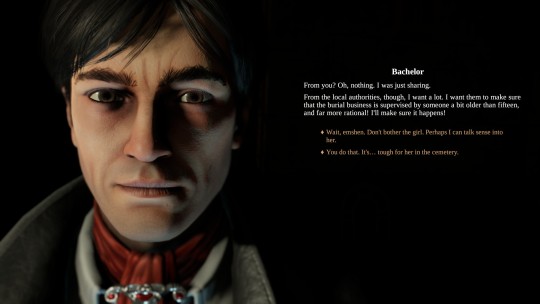
From you? Oh, nothing. I was just sharing.
to daniil, they were just having a normal conversation. but some part of this - his tone or his words or maybe even his body language - didn’t give artemy the impression that this was supposed to be a regular conversation. (we could, in fact, attribute the same idea to artemy here; why didn’t artemy pick up that this was a normal conversation? the reason i count it towards daniil is because artemy doesn’t seem to have this problem with anybody else. for the record: i don’t think artemy is neurotypical either.)
abnormalities in eye contact and body language
it’s hard to get proof of this in video games, but i will say i think it’s very funny that in pathologic 2 daniil’s idle animations are “pacing”, “sitting like he desperately wants to start bouncing his knees but is stopping himself from doing it”, and “standing unnaturally still” - but there you go. i don’t know anything about making gifs, or i’d gif this one specific talk menu idle he does where he holds eye contact for about three seconds, looks away uncomfortably, and then looks back out of the corner of his eyes.
deficits in […] understand[ing] relationships
mostly examples from his route in classic:
when the army arrives, he can claim to block that aglaya, whom he’s known for two days, is his best friend
he seems baffled by the fact that everone is smitten with maria and working with her, and seems equally baffled by the idea that she’s smitten with him
despite eva implying on day two that she is in a relationship with andrey, is completely blindsided by the revelation on day 6, asking him, “How in the world is she ‘your woman’?”
i’d also like to use his sign-off on his letter to artemy, day 2 of the haruspex route - he signs it as “Your friend (hopefully)”. i know i’m not the only autistic person who used to ask people if we were friends or not. pro tip, if you’ve never done this: don’t. it really weirds people out.
difficulties adjusting behavior to suit various social contexts
the fact that he stands out is blatantly obvious even in pathologic 2 and in the haruspex route of classic. people will comment on him being an outsider and mention that they don’t trust him. but you can watch it happen in real time in his route, because he never fully acclimates to the town. he says something about this to aglaya on day 7:
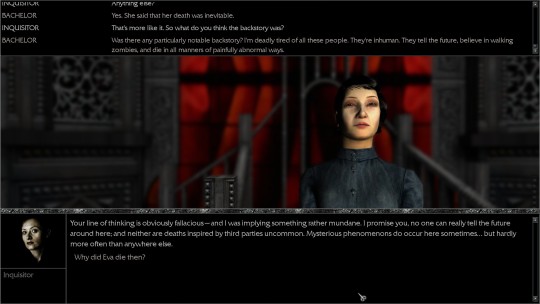
Bachelor: Was there any particularly notable backstory? I’m deadly tired of all these people. They’re inhuman. They tell the future, believe in walking zombies, and die in all manners of painfully abnormal ways. Inquisitor: Your line of t hinking is obviously falacious - and I was implying something rather mundane. I promise you, no one can really tell the future around here: and neither are deaths inspired by third parties uncommon. Mysterious phenomenons do occur here sometimes… but hardly more often than anywhere else.
actually, there’s an example of him saying something similar to artemy on day 5 in pathologic 2:
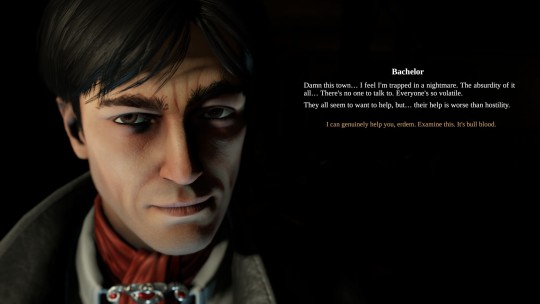
Damn this town… I feel I’m trapped in a nightmare. The absurdity of it all… There’s no one to talk to. Everyone’s so volatile. They all seem to want to help, but… their help is worse than hostility.
some of this can be explained by the town’s strangeness, but keep in mind that the first instance happens after he’s been there and involved in the ongoing for an entire week, and the second at nearly a week in. clearly he’s struggling to adjust to the changes.
it’s also worth noting that his reason for fleeing the town in the nocturnal ending?
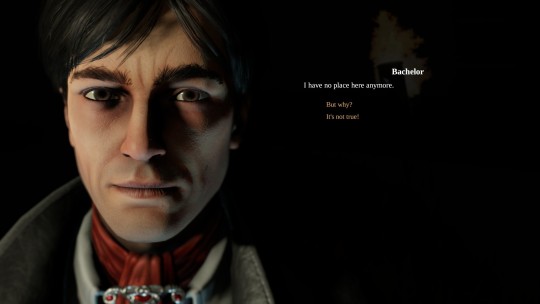
I have no place here anymore.
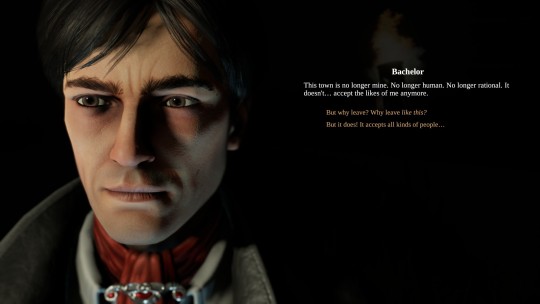
This town is no longer mine. No longer human. No longer rational. It doesn’t… accept the likes of me anymore.
repetitive motor movements or speech
it’s harder to see the motor movements in classic, but remember how i pointed out earlier that he paces? pacing is a form of stimming. murky, who is canonically autistic, can also be found pacing as one of her idle animations. having stock phrases for characters to speak when you come near them already ticks off the box on “repetitive speech”, but that by itself doesn’t really cover what they’re talking about - echolalia.
but you know what this does fit with? “‘quoting’ things(communication is HARD! sometimes we need to take shortcuts and use someone else’s words)“
i’ll get to the more obvious example in a minute - i want to point out something that happens very early in pathologic 2 first. you know how you first meet him and artemy accuses daniil of trying to guilt-trip him by asking if it’s true that isidor would still be alive if artemy had come sooner? keep in mind that he spoke to rubin first. and this is what rubin says, when you get a chance to talk to him:
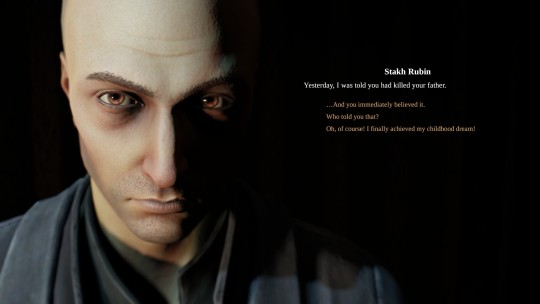
Yesterday, I was told you had killed your father.

That’s not far from the truth, Burakh.
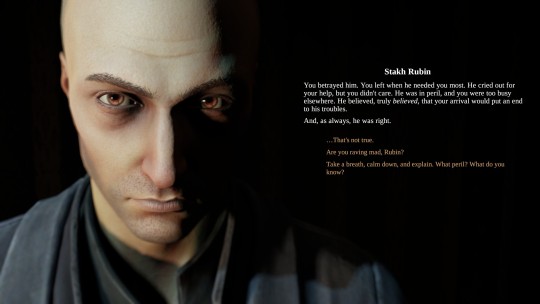
You betrayed him. You left when he needed you most. He cried out for your help, but you didn’t care. He was in peril, and you were too busy elsewhere, He believed, truly believed, that your arrival would put an end to his troubles. And, as always, he was right.
i’m not saying this was necessarily the game’s intent, but it’s entirely possible daniil is parroting back to artemy exactly what rubin said to him.
now, for what you’re probably expecting in this section: the latin. people love to refer to his use of latin as “random”, so let’s clear that up:
it is not latin daniil has made up. with the exception of latin that is mispelled in the game’s texts, all of them are proverbs or otherwise common sayings. you can find most of them on the wikipedia list of latin phrases, or through a 3-second google search.
he’s a doctor. him having taken latin isn’t anymore strange than a lawyer taking latin. in fact, if you pay attention, artemy also took latin; this is implied when artemy tells him he’s always sucked at it.
his uses of latin actually aren’t random at all. what he says fits the situation, and sometimes is used in place of him having to come up with something to say on his own.
prime example:
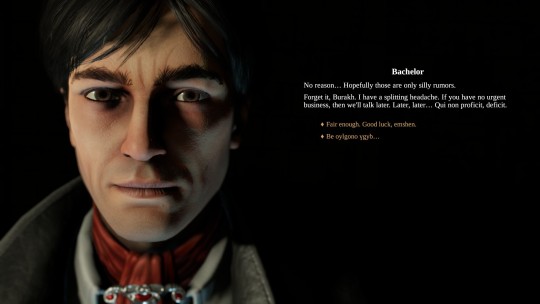
Forget it, Burakh. I have a splitting headache. If you have no urgent business, then we’ll talk later. Later, later… Qui non proficit, deficit.
qui non proficit, deficit - he who does not advance, loses ground. in other words, “i’m sorry, but i really do need to keep working.” one of his voice lines.
as for why he doesn’t translate the latin: it probably wouldn’t even occur to him to. these are not obscure sayings. the utopians all have a certain degree of education - what would he need to translate them for?
this bleeds into something that isn’t really mentioned, but that i’ve found i have a lot of trouble with in everyday life. autistic people have a tendency to either overexplain (and then have everyone get mad at you because they feel you’re being condescending) or underexplain (and have everyone get mad at you because you haven’t explained anything). the latin would be a case where it feels like a justified underexplanation. you’ll notice that when it comes to anything scientific, he tends to do the reverse, and overexplain. this also happens in classic, whether artemy has asked him to clarify or not.
rigid thinking patterns
the thing i had marked for this was simply his strict adherence to western medical practices and refusal to acknowledge the supernatural, even when it seems obvious - he has a conversation in his route in classic with yulia about this, and that is in fact how he manages to get to her: by asking saburov if there are any other logical skeptics in town. it should be noted they seem to be breaking with this in pathologic 2, where one of his voicelines is “I’m no positivist. There are things in this world beyond our mundane perception.” i have no idea where they’re planning on going with that.
there’s also a quote floating somewhere around twitter about him having been raised by a military man, and militaries tend to enforce very rigid routines. you could say the same thing of block - who (in classic at least) i also have my suspicions about.
highly restricted, fixated interests that are abnormal in intensity or focus
special interests. the one that should obviously come to mind is thanatology, though i would argue latin if not classics in general is a special interest of his as well - in addition to his usage of latin, he also references pericles in the marble nest and was probably refering to the roman occupation of haruspicy in addition to augurs in the same text. he also makes references to shakespeare more than once in both marble nest and pathologic 2.
hyper- or hyperoreactivity to sensory input
i don’t have much written down for this one but there seem to be several places in classic especially where he asks npcs to stop shouting at him. we don’t really have the privilege to know their volume or how they’re interacting with him, but i think it’s also worth noting that he’s the only one of the healers who wears gloves. in pathologic 2 he’s the only named character i can think of who wears them at all. his thing in the lucid dream about the brain being “a border”? gloves are his border, as is his jacket, which may be worn to cut down on sensory issues.
he will also sometimes seem to “overreact” to the situation at hand - such as in classic, when some dogheads mispeak and say that daniil is going to “sterilize” them, and instead of understanding that they must have mispoken, freaks out over the idea that they think they’re going to be… well… sterilized. or in haruspex route, when his reaction to the inquisitor arriving is to threaten suicide.
miscellaneous
he never goes anywhere without that carpet bag. we don’t see it in pathologic 2, but we do hear about it and he doesn’t let it go for a second in classic - not even in the cutscenes where he’s using the microscope. his bag could be a comfort item.
“getting very attached to things like inanimate objects” could work for the bag - but you know what it actually fits the bill much more obviously? the polyhedron. in the haruspex route he recognizes that it’s a lost cause, but he’s still too attached to it to let it go.
in classic at least, daniil is absolutely terrible at lying. most autistic people either are not good at lying, or feel uncomfortable or anxious with having to lie. when he’s asked by yulia and the kids in the polyhedron to lie to block (for different reasons) he’s clearly uncomfortable with the idea that it’ll work. and when it actually comes time to come up with a way to lie to block about why he needs five rifles, your options are to either buckle and tell him the truth, or simply say that you need them for “self-defense”. block believes that you’re not lying to him, but daniil can’t come up with any embeleshments to explain why he needs what he’s asking for.
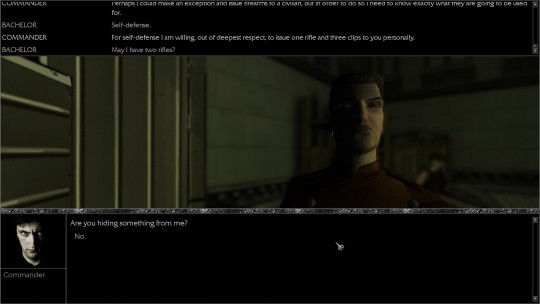
Commander: Are you hiding something from me? Bachelor: No.
he comes across as naive to other characters. in classic, capella has a voiceline saying, “The Bachelor is not smart. Intelligent, yes… but not smart.” in Pathologic 2, Daniil complains that Aglaya takes him for “a useless dreamer”. he’s also easily used by the Kains to fulfill their endgame in classic.
my final, and absolute favorite: he takes things way too literally. autistic people (and adhd people, from my understanding) have a hard time differentiating jokes and sarcasm. so my favorite moment in marble nest is a case of him taking that earlier advice - to “take heart” literally, by bringing the tragedians a literal human heart:
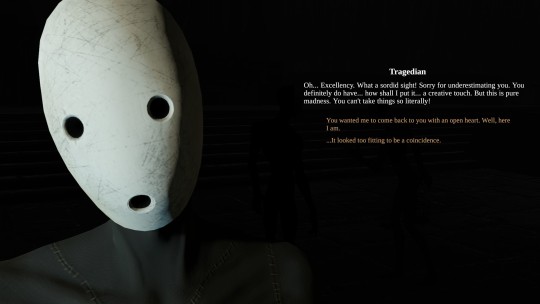
Tragedian: Oh… Excellency. What a sordid sight! Sorry for underestimating you. You definitely do have… how shall I put it… a creative touch. But this is pure madness. You can’t take things so literally! Daniil: You wanted me to come back to you with an open heart. Well, here I am. …It looked too fitting to be a coincidence.
your mind map, after this, updates to say “I misunderstood the tragedians.”
conclusion
people don’t stop being autistic with age and i think he’s a good example of what it’s like to be in your late 20s and be autistic. i’m sure i missed things as i haven’t finished haruspex route of classic yet and there may just be some other things he does or says that i missed! if anyone has anything to add they think fits i would love to know, thank you for your time :)
#icarus.txt#autistic daniil dankovsky#daniil dankovsky#pathologic meta#ok to rb but i'm not interest in your ''but he's just weird!'' arguments#please keep in mind that this post is about autism#and that this is written by someone w autism...#popular
333 notes
·
View notes
Note
How differently do you see elves and humans in eqrly tolkien handling trauma and neurodivergent situations that in the third age when the two races have more time to compare like healer notes and stuff?
oh! oh I like this question.
(disclaimer: everything here is based on my own headcanons. Tolkien clearly depicted mental illness in his works, though it’s more present in LotR than in the Silm, but he didn’t ever diagnose his characters and didn’t go into detail examining their mental states from an academic or analytical perspective except to defend Frodo for breaking under Sauron’s influence)
the first thing I want to say is that I pretty strongly headcanon all of the eldar regardless of ethnic group (and all dwarves, and all hobbits, but they’re not really the focus of this ask) as neurodivergent compared to the average human population. neurodivergence exists in humans too! there are autistic and ADHD humans because we’ve always existed in humanity. but the average human is (sadly) neurotypical, and if you use diagnostic standards meant to find out which humans are ND and turn them on elves, the answer you get is “all elves are ND”. some elves (Maitimo comes to mind in my headcanons) are ND-by-elvish-standards, and learning disabilities and cognitive disabilities also exist in elvish neurology? but there are differences in how these traits manifest.
Elves in the First Age really don’t know much about psychology but it’s not for lack of trying. Even in our world, psychology is a very new science, and a lot is being discovered about it pretty regularly that requires constant updates and development of knowledge. They see trauma as something that causes a mental wound, and that mental wound can be as impactful and lasting as a physical wound, but they’re not really sure how to address chronic illness. Míriel’s postpartum depression was the first real example of their “mental wound” model failing - she not only didn’t get better over time, she didn’t seem to want to. That being said, her death was also a catalyst for elven healers to try and learn from their society’s mistakes, and by the time of Maitimo’s recovery in Mithrim (in BH) you have Endanáro and Amdis saying that he needs to devote time and energy to healing his mind and accepting that he’s not okay. It’s well-meaning, but awkward, and very new.
Elves also struggle for the first five generations or so with the concept of emotional maturity. I’ve mentioned before that Finwë fails as a parent because he and others of his generation based childrearing on what they observed in animals, where there’s support and intimacy and duties assumed by the parent until physical maturity - he didn’t think that Fëanáro might have needed emotional support or that his responsibilities included forming a psychologically healthy space, because he was never a child, and had nothing to draw on personally, and the children who were born in Cuiviénen and on the Great Journey are very different psychologically from his son and so can’t provide much of an opinion on his parenting techniques.
Humans, on the other hand - they start in the same place, but they pick up on things a lot faster, if only because they’ve got generational turnover happening fast compared to the elves. There are a lot more children, since humans don’t have the level of control over their lives that elves do and unplanned pregnancy is a pretty normal occurrence, and they mature pretty quickly and then have kids of their own. Trial and error and passing on knowledge the same way elves do (communally, from one person to another) means it’s pretty easy to get information about basically anything once you’ve got a couple centuries under your belt as a people group.
The thing about neurodiversity is that it’s not really something that was a problem historically in the same way it’s a problem now. If you’ve got a kid who doesn’t talk much but who’s really good at making baskets and never gets tired of it, or a kid who loves to talk and tell stories but who loses track of time and can’t keep a good count on weaving, or who absorbs information about the natural world like a sponge but can’t navigate a social function to save their life? you can use that, in a society that’s not ours! you need craftspeople, and storytellers and historians, and healers and hunters - find a thing this kid can do well and thrives on, and let them loose. (Also, ND people with different circadian rhythms can keep watch more easily or keep different schedules to attend to the animals.) I actually think ND elves had a harder time than ND humans, originally, because elvish society was more formalized more quickly - it’s easier to find out you don’t fit into a box if there’s a box in the first place. (by “harder time” I mean that there was uh. one? one case? of “I’m the head of this family you will have the life I say you have you will be good at what I want you to be good at and you will not question me or defy me.” this was not the norm for elvish society but that kind of thing didn’t really have the opportunity to exist for First Age Atani.)
But time passes, the world changes, and with those changes comes shifts in... well, everything. By the Third Age, elvish healers and Mannish healers have gotten very good at figuring out trauma, though their situations have actually reversed in many ways. Elves are now more or less nonexistent as a settled-agriculture civilization, with Mirkwood and Lothlórien being the only real exceptions (and Lórien is on its way out) while Men have formal, structured, settled civilization. As a result I think you see a lot more trouble in the more formal Mannish societies with neurodivergence, but a lot less potential for trouble in elvendom.
As to notes, though - yeah, actually, I think there would be a lot of time to do comparisons! Most of that scholarship is probably in Rivendell - I think there might have been the beginnings of a psychological-study group in the Gwaith in Ost-in-Edhil, especially because of all the races working together and the chances for comparisons? And their writings probably escaped in bits and pieces, as well as some of the scholars; Elrond would have collected everything he could. Unfortunately, Sauron really killed the spirit of cooperation and interspecies friendliness that existed in Eregion, so I’m not sure how much of that would survive into the Third Age proper. Interested scholars would have to travel to Rivendell, perhaps to interview the surviving scientists, and maybe take some of their findings back to Minas Tirith or Dol Amroth or Lothlórien, perhaps with copies of some of the writing. (How seriously this scholarship is taken is a different matter)
If I were to offer a basic overview of what the average academic might find - I think an elvish scholar from the Third Age would be surprised at how much Mannish civilizations have changed, and they’d be impressed by the breadth and depth of trauma writing from places like Minas Tirith where there’s always a war on somewhere. Meanwhile mannish scholars from Arnor or Gondor would be surprised at the fact that elves write about and study trauma at all - they’d probably learn about Míriel and Fëanáro in history classes and assume that elves just don’t have trauma psychology, only to find out that several thousand years’ worth of academic study has lent a few results. I’m not sure if either side has much to offer the other except when it comes to the intersection of trauma and neurodivergence - ND humans are a lot like “normal” elves, after all, and elvish techniques for addressing and treating PTSD and other related trauma disorders might be more helpful than human techniques. But what humans have works for them, more or less? They’re a lot less rigid and structured and ableist as a society than humans in our world are, even at their most formal. (Plenty of individual humans are still super ableist or rigid or unfair! it’s just not a social norm, and it’s not an institutionalized axis of oppression.)
52 notes
·
View notes
Text
Hello, Grey. Hope you’re doing well.
First off, a note for your information. I’m autistic, and tend to come off as incredibly direct without meaning to. Do read straightforward bluntness in this ask as genuine, matter-of-fact forthrightness, please. No aggression or derision is intended by anything I write hereafter.
Recently you made a post responding to an Anonymous ask referring to a question about non-binary cats in Ailuronymy’s character generator that was asked by the same Ruddles five years ago. I couldn’t follow your argumentation in either post, nor understood what you found wrong about the original question of that Ruddles.
Grey’s notes: hello there. I’m putting all of this under a read-more since there’s already a lot of words here. I would like to settle this matter and so I hope this might give you some answers–but if not, I’m sorry but I’m not really looking to continue the conversation any further. I didn’t really volunteer to have to deal with this kind of thing when I started writing a blog about pretend cats, and while I am very happy to try to educate and do what I can with the knowledge and little platform I have, this particular kind of education not what I’m here for and I’d prefer not to spend my time on it more than is necessary.
I have absolutely nothing against nonbinary people. I also consider real-life commonality a possible valid argument for commonality in a character generator for a fictional world that is integrated into a version of real Earth.
This is where we disagree. In real life, non-binary people are (allegedly) less common than binary people. I’m willing to agree with you on that. However, that is also not actually the issue I have and to explain what I mean by that I want to raise two points:
1. why should a for-fun name or character generator be expected to reflect real-world statistics?
2. why is the non-binary entry the sticking point, and not the the statistical over-presence of albinistic cats, for example, or white cats with blue eyes that aren’t deaf, or tortoiseshell toms?
If I made a character generator for a pseudo-medieval fantasy, would you expect me to carefully ensure that the ratio of kings to peasants was correct? Would I be expected to put several thousand peasant entries in, and only one monarch, so that it would “accurately” reflect the “real world” (note: pseudo-medieval fantasy is not a real place or time, just like the world of Warriors is not)–or would people recognise that a character generator is merely a prompt and not something that needs to be taken literally? A character generator is simply holding up an option to you, which you are free to take or leave or change as you desire.
The fact that the non-binary entry is the issue and none of the others I’ve listed–all of which are “statistical errors” within the context of the generator–reveals that this is not actually a concern about accuracy. If it was simply a concern about accuracy, then the person would be considering all of the ways in which my generator does not deliver an accurate reflection of “the real world.” But it’s not about accuracy, it’s specifically about the non-binary entry. And that is why I have an issue with this stance.
If you can look at an otherwise error-filled generator and express concern only about the fact you have to see the word “non-binary” more frequently than you think is correct, that is a bigoted mindset. The non-binary entry in the generator is exactly as common as “tom” and “molly”: a one-in-three chance. You have two-out-of-three chances to see a binary gender, which is still a majority.
I understand if you don’t want to spend your time on this, and respect your decision to do so if you so choose. However, I would like to understand why the above argument I mentioned isn’t valid in your eyes, and what makes inquiring about the generator ratio’s incongruence with real life ratios in humans instantly bigoted, since I wasn’t able to follow the reasoning there. How can asking a mere question that, to my eyes, seemed innocent, qualify as being bigoted? Isn’t the definition of bigotry more in the direction of an actively damaging, enduring prejudice?
It is not a good faith question, even if the person asking isn’t intentionally trying to be prejudiced or is asking the question in genuine curiosity. The question itself is not innocent. I think it is a mistake to refer to any question as “mere” because many questions can in fact be insidious, hurtful, inappropriate, malicious, or intentionally derailing.
I would also like to point out that “sealioning” is a technique that certain people use to exhaust people by asking questions. That’s not what the anon who asked me was doing (I believe this was entirely an isolated incident and not actively malicious), but it’s not uncommon for marginalised people to be asked seemingly innocuous questions with the intent to exhaust, derail, infuriate, or belittle them. I can recommend watching carefully for this kind of behaviour, because it often takes the form of “polite” or “innocent” questioning--and then getting performatively upset when the person eventually refuses to engage anymore.
Answering questions takes time and effort and energy, especially when the question is “explain why you should have rights” or “I don’t see why [thing that hurts you is bad], please explain in detail,” so sometimes people get fed up and lash out after being needled at length with similar. (This is kind of a detour, but I felt it’s worth acknowledging the way in which question-asking can actually be weaponised against marginalised people).
Anyway, as I said above, to isolate the frequency of the non-binary as an issue in a context where statistical accuracy is not assumed or required and would not be expected of other traits reveals that the person asking has an issue with non-binary being as present as it is. What does the person asking this question seek to achieve? If the non-binary entry in the generator is reduced in frequency to a “normal” or “accurate” level, what does that actually accomplish?
One could certainly make the argument that it’s fallacious to relate real-life commonality to generator commonality, bringing forth whichever reasons one might choose; but instead in your response back then you chose to instead personally criticize the commenter while skipping over their actual question. How come? What made it invalid to address?
Sometimes I am tired and people make me cross with the things they say, so I be short with them and say exactly what I think of their behaviour, rather than hold their hand like a kindergarten teacher. If I was asked the same thing today, I would probably have been gentler and attempted to be more informative, because I have become gentler as a person in the five years since I answered that ask. I’m sure you can understand. Sometimes I’m not playing 4d chess and don’t have the wisdom and forethought of the sages. Sometimes I’m just a cranky old guy writing about cats who gets interrupted and has to tell someone to get over their nonsense.
The Ruddles from back then didn’t imply viewing non-binary people negatively in any way, did they? (Genuine question; due to being autistic I’m not good at reading peoples’ intentions, and even worse at it over text.)
The implication is the question. Perhaps this person really did believe they “don’t have a problem with non-binary people”–but they clearly had enough of a problem with the word showing up 1/3 times on a generator to come and request for me, the creator, to make the word less common so they did not have to see it as much. That is not something a person does when they legitimately don’t have a problem with non-binary existence.
How did what they asked have the potential to hurt anyone?
The question is hurtful implicitly because it calls into question the validity of the non-binary entry taking up space in the generator, and I suspect that could possibly hurt people’s feelings to read.
But the big issue is actually what that person might also do. The question itself can do very little, but the unchallenged prejudice that caused the question to be asked at all can be very hurtful if left unchecked. That’s why I go to the effort to answer questions here.
Why did you consider their train of thought about relating commonality in the generator to commonality IRL unkind or self-centred? It seems an obvious and innocuous connection to make, to me. Where does kindness or the lack of it come into the matter? How I understood, the argument appears focused only on factual observations of our reality, rather than making any statement disliking the inclusion of non-binary as an option in the generator, or equivalent.
There’s a phrase some people like to use that says “facts don’t care about your feelings.” But we are not facts and we can choose how we interpret and deliver facts to one another. Unkindness features in this question in the absence of considering how non-binary people might feel seeing themselves represented in the generator, and how it might feel to have someone quibbling over “commonality,” like they are a hypothetical to be debated, instead of real people who will read the question on my blog.
Many people have thanked me over the years for including the entry and I care about how they feel. I felt that the person asking that question cared only about comforting their own worldview, instead of ceding some space in it for others–at no personal cost.
As far as I can tell, there ought to be some layer of personal prejudice that seems invisible to me in the original Ruddles’ question, else your response wouldn’t make sense - and I doubt that’s the case, based on what I’ve read from you the last few years.
I understand that you may not want to respond to this for whatever reason. Maybe it would take too long, maybe you don’t want to open this can of beans, or consider me a lost cause for my confusion.
That is fine. I accept your choice.
But if you do want to help me understand, I’d be thankful for a short explanation about your reasoning, so I can gain the contextual information to evaluate whether my own viewpoints, that wouldn’t have considered the initial Anonymous question from 2015 to be anything but an innocuous inquiry phrased a bit unfortunately, have the potential to cause hurt in the future.
I’m afraid I can’t really give a short explanation, given how much you’ve asked for me to clarify in this message, but I hope this reply clarifies what you’re struggling with.
For what it’s worth, I think caring about the impact you have on others is the best possible place to come from as a person, so I don’t think you’re a lost cause. Best of luck to you in the future.
I don’t want to unintentionally (or intentionally, for that matter) make anyone’s life worse, especially not that of people belonging to a group that already faces so many undeserved struggles in this world. That’s why I chose to write this, even if it may seem overly lengthy or not worth the effort to some.
Take care, and thanks for reading
Anony Mouse
9 notes
·
View notes